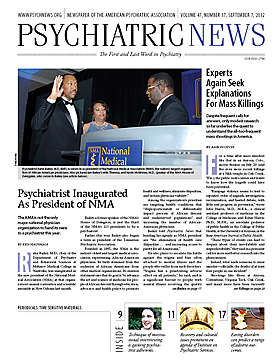Even after 40 years of practicing, I am still awed by our ability as psychiatrists to take a person whose mental health is in jeopardy and help him or her toward recovery.
That’s what being a psychiatrist is about, of course, but it’s not all we’re about. In these turbulent times, I believe we can do as much good for our patients by being part of the public debate as we can in our offices.
I have been involved in organized medicine for more than 30 years—locally at what was then the Arapahoe County Medical Society and the Colorado Medical Society. More recently in APA, and since 1993, the AMA.
I became president of the AMA because I wanted to help make physicians aware of changes in our health system, what they can do to prepare, and how the AMA can assist.
Health system reform is certainly a 21st-century issue, but it is also an issue the AMA has worked for since it was organized—and that includes reform of mental health care.
Long before the Affordable Care Act (ACA), the AMA called for parity for mental health coverage. Since 2008, the AMA has been part of the Coalition for Fairness in Mental Illness Coverage. We supported the mental health benefits of the ACA.
In the time since the ACA was passed, we have been part of the debate over how various aspects of the law would actually work—always representing the interests of physicians and our patients. We have seen victories—notably in the rule changes that allow physicians to head accountable care organizations, changes in electronic health record mandates, and the delay in implementation of ICD-10—but our work is far from finished.
The ACA’s expansion of team-based medicine is an example of something that the AMA espouses, but where we’re still fighting to ensure that reality matches the concept.
Back in 2006, the AMA formed our Scope of Practice Partnership to make sure patients are treated by qualified providers.
In 2011, we tracked more than 400 individual bills involving improper scope-of-practice expansions. To address this problem, we created data series modules on topics including the history of the profession, education and training, licensure and regulation, research on quality of care, analysis of state laws, and demographics.
With this data, for example, we can show a legislator that psychologists and psychiatrists practice in the exact same parts of the state—and that any sort of “access to care” gap is a myth.
This is important work. And if the AMA weren’t there, who else would carry it out?
We have made a difference because we represent the breadth and depth of the medical profession and medical practices. And we rarely work alone. For the past decade or more, I’m proud to report that APA and the AMA have collaborated on a variety of issues.
I am only one of several psychiatrists in AMA leadership positions. Fellow psychiatrist Patrice Harris is on the AMA Board of Trustees. Former APA President John McIntyre is serving a second term on our influential Council on Medical Service. Louis Kraus is on our Council on Science and Public Health. Alfred Herzog and Clifford Moy sit on the Council on Long-Range Planning and Development. Others work in key policy areas or with other specialties.
The expertise and authority that psychiatrists bring to the AMA have not only affected health system reform and mental health issues but also many other matters.
As for me personally, as AMA president I want to focus attention on the need to better integrate mental health and mental illness into the rest of medical care, thereby providing more resources to treat more people.
As a psychiatrist, I believe that the AMA is the best place for me to do this.
In addition to its invaluable public role, the AMA offers materials to help physicians on many levels, from practice management tools to highly respected research and education resources.
If you are not a member of the AMA, please join us. Your very presence will make a difference. And should you be so inclined, your active involvement will be greatly appreciated.
Because with or without us, the system is changing—and believe me, we will all be better off if the changes occur with physician involvement and input.
Do it for your colleagues too, and for your patients. Because if we don’t speak out for physicians and patients in this kaleidoscope of health system changes, who will?

Jeremy Lazarus, M.D., is president of the AMA and a former speaker of the APA Assembly.

